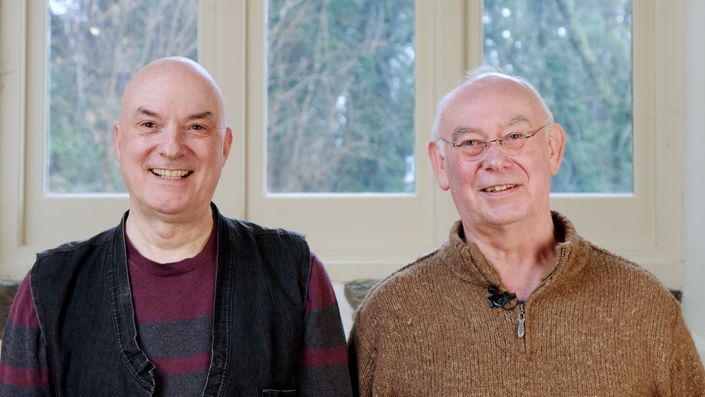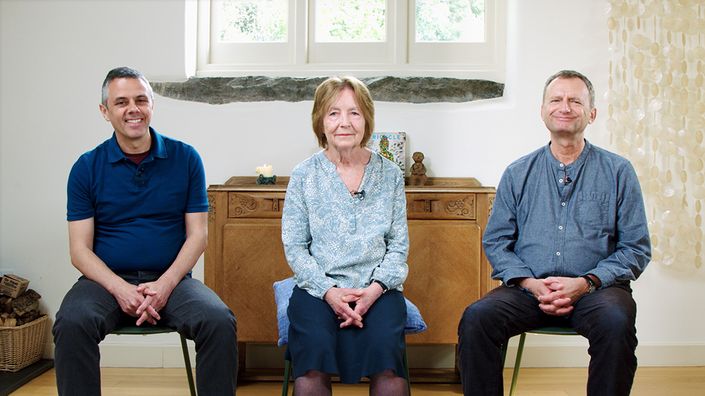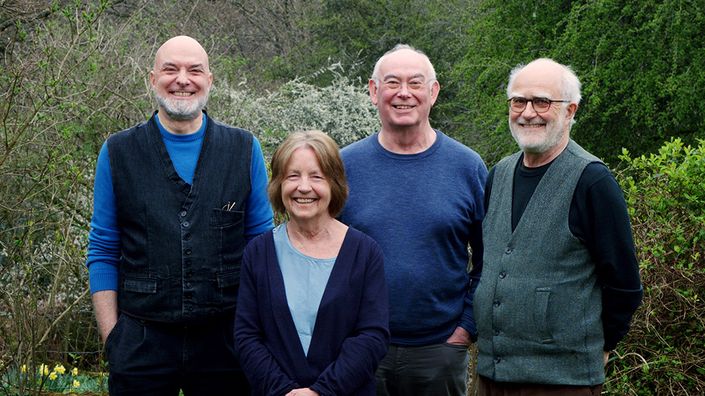The Good Life: Understanding Buddhist Ethics
Find the true heart of the teachings.
An online course with John Peacock and Akincano Weber.
This online course will deepen your knowledge of Buddhist ethical principles and give you practical tools for wise engagement.

A path of care... and action
You may have heard Buddhist ethics summarized as a list of precepts or as a precondition for deep meditation. But ethics is so much richer than that. It is an inquiry into how we live and what we live for.
This is an enlivening journey that also brings happiness, purpose, and solace with it. Seen in this way, the whole of the Buddhist path becomes an ethical project.
The Good Life is available now.

Participate at your own pace
This easy-to-use online course is available to all. It comprises of 6-units that form a program of instruction, discussion, meditation, and inquiry.
Each unit contains around 1-hour of material to enjoy, as well as contemplative exercises.
You are free to study at your own pace, and will retain access to the material.
You can follow the course on a computer, tablet, or phone, or download the course as audio files.
Key Benefits
• Appreciate the ethical dimensions of the Eightfold Path.
• Take on the Brahmaviharas as ethical practices.
• Explore five ancient rules of ethical training.
• Foster greater self respect and respect for others.
• Bring what you have learned into the world.

Live your values
Ethics is the connective tissue of Buddhist practice. This course will help you to reflect on what is important to you and to close the gap between your intentions and how you actually live.

Learn from founding members of Bodhi College
Akincano Weber and John Peacock are founding faculty members of Bodhi College. Bodhi College is an educational charity offering contemplative programs for contemporary life.

Stimulating discussions
See John and Akincano bounce ideas off each other as they rethink our contemporary understanding of Buddhist ethics.

All Buddhist terms explained
This is a practical course about putting ethical teachings to use in our lives. Sometimes it's useful to know a little ancient Buddhist terminology but all such terms are explained with helpful definitions wherever they occur. A collection of key excerpts from early Buddhist texts is also included, if you wish to go deeper into this material.

No previous experience necessary
There is no requirement to have studied any previous course or have prior knowledge of this topic. The Good Life is suitable for beginners and experienced meditators alike.

Take the course with you
You don't need to be sitting at a computer to take this course. You can use a tablet or phone, or even download the audio files or a printable workbook, and head off into nature or to a café.

Guided Meditations
Embark on a program of guided meditation designed to cultivate inner peace and outer engagement. These practices develop ethical and situational awareness, appreciation, love for oneself and others, and many beneficial qualities.
Ethics is the foundation and the goal
The Buddhist path flows from ethics through stillness and wisdom, and opens out into an ethical life. Buddhist ethics involves many factors, some prominent aspects are listed below.
The Eightfold Path
The Brahmavihāras
The Precepts
Respect for Self and Others
Care and consideration (appamāda)
Attentional availability
How Ethics Leads to Deeper Meditation
Akincano presents the basic model of how skillful conduct leads to deeper stillness and greater insight.
Testimonials
Praise for The Good Life, featuring Akincano Weber and John Peacock
This is an extremely well-crafted course, and is deftly presented by weaving the relevance of the material into our daily engaged practice. Both Akincano and John are well-versed in the intricacies and challenges of ethical living, and they make the material wholly approachable by using various facets of Buddhist precepts, concepts and body-heart-mind qualities. I absolutely recommend this course to anyone who wishes to engage with the world with the highest ethical resonance.
If you would like a little more emphasis on community and social relationships, rather than the individual, in your Buddhist explorations, then these two wise teachers have some really valuable things to say to you.
One of the most enjoyable online courses I’ve taken. It’s still resonating within me.

John Peacock
John Peacock is a retired academic and a Buddhist practitioner for over fifty years. He initially trained in the Tibetan Gelugpa tradition in India and subsequently studied Theravada in Sri Lanka. He lectured in philosophy at the University of Manchester, Buddhist Studies at the University of Bristol and finally became co-director of the Masters degree in Mindfulness-based Cognitive Therapy at the University of Oxford. John has been teaching meditation for over thirty years and continues to research and teach the similarities and differences between early Greek thought and practice, existentialism and early Buddhism. He has a particular focus on ethics within all of these different approaches.

Akincano Weber
Akincano M. Weber is a European Buddhist teacher and contemplative psychotherapist (MA). A former monk, he has lived and practised for 20 years in European and Thai Forest monasteries. Today he is the guiding teacher of Atammaya Cologne, co-founder of Bodhi College and part of several dharma and mindfulness teacher training programmes. He has been teaching meditation and Buddhist Psychology in secular and traditional contexts in Europe and overseas for many years and lives with his partner in the Rhineland, Germany.
Akincano has a particular interest in contemplative psychology, the practice of stillness, and the cultural translation of the wisdom teachings of early Buddhism for people of today.
Course Curriculum
Click the arrow below to see the full program.
- Introduction (8:19)
- Why Ethics? (19:06)
- The Role of Ethics (16:17)
- Check Your Understanding
- Meditation 1: Becoming Receptive to Experience (13:59)
- Reflect
- Teacher Discussion: A Different Way to Live (11:17)
- Discuss
- In Daily Life (6:08)
- Summary
- The Sutta Reader
- Live Q&A Sessions (126:00)
- Downloads
- Bonus Discussion: No Fixed Answers (5:34)
- Introduction (3:37)
- An Overview of the Eightfold Path
- Seeking the Good (21:31)
- A Path of Care and Consideration (20:41)
- Check Your Understanding
- Meditation 2: A Caring Attention (13:49)
- Reflect
- Teacher Discussion: Practicing the Eightfold Path Appropriately (32:08)
- Discuss
- In Daily Life (3:32)
- Summary
- Introduction (5:07)
- The Brahmaviharas as Ethical Capacities (32:42)
- The Brahmaviharas as Ways of Relating (13:22)
- Check Your Understanding
- Meditation 3: Appreciating Someone Close to You (12:39)
- Reflect
- Teacher Discussion: How Should We Cultivate the Brahmavihāras? (16:04)
- Discuss
- In Daily Life (5:44)
- Summary
- Introduction (3:20)
- Precepts as Ethical Questions (31:18)
- Unpacking the Five Precepts, Part 1 (19:15)
- Unpacking the Five Precepts, Part 2 (26:02)
- Check Your Understanding
- Meditation 4: Tuning Into the Precepts (13:22)
- Reflect
- Teacher Discussion: Looking at the Precepts Through Different Lenses (26:23)
- Discuss
- In Daily Life (9:38)
- Summary
How the Journey Unfolds
This six-unit online course blazes with insights into the nature of the mind, living wisely, and the Buddhist path itself.

The Elephant in the Dharma Hall
"The elephant in the Dharma Hall was the unquestioned social, political, and ethical dimensions of the structures that we all inhabit. Despite its looming presence, this elephant is mostly ignored. There is a refusal to recognize its existence, let alone address it in any significant way. It appeared to me then, as it does now, that unless we bring into full recognition our implication in the devastation of the world via our unexamined complicity in the capitalist and consumerist structures that bring about that devastation, then something is horribly awry with contemporary Buddhism and the mindfulness movements that have their origins in Buddhism."
—John Peacock, 'The Elephant in the Dharma Hall'
A Note From the Editor
The Good Life: Understanding Buddhist Ethics sees John Peacock and Akincano Weber reunited after their popular course, The Spiral to Freedom, which received some of the strongest positive feedback of any of our offerings. The topic of ethics is especially close to John's heart and, for him, The Good Life is by far the most important course he has been involved with. Akincano, too, firmly believes that ethics has been undervalued during Buddhism's transmission to Western cultures so far.
This course is essential for those interested in ethics and philosophy, but also for anyone looking for a holistic vision of Buddhist practice that encompasses the whole of their lives and relationships. So while The Good Life isn't focused on solitary meditation, this too is an area that can dramatically improve through an informed practice of ethics. And this course presents ethics as exactly that: something we can do. Expect a deepening program of guidance and meditation, edifying discussions, as well as a radical and sometimes provocative emphasis on ethics and engagement as the true heart of the Buddhist path.
—Mark Cooper, Course Developer

About Bodhi College
The purpose of Bodhi College is to develop fresh ways of understanding the dharma today through rediscovering the core insights of early Buddhist teachings. Courses provide a contemplative education that inspires students to realize the values of the dharma (Buddhist teachings) in the context of this secular age and culture.
In the spirit of the Buddha’s teaching, Bodhi College is committed to a middle way of human awakening that integrates theory with practice, encouraging both personal fulfillment and social engagement.
Related Courses
You may also be interested in these online courses from Bodhi College and Tricycle.




